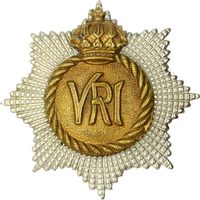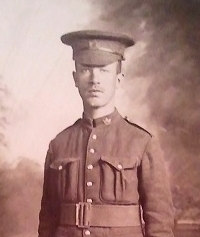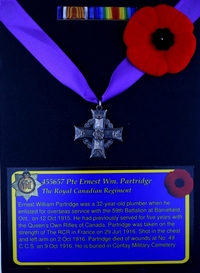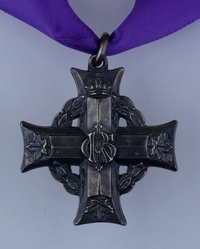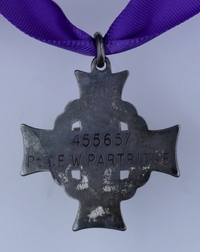
455657 Pte Ernest William Partridge
Queen's Own Rifles
59th Overseas Battalion, C.E.F.
The Royal Canadian Regiment
By: Capt (ret'd) Michael M. O'Leary, CD, The RCR
Ernest William Partridge was born in Toronto, Ontario, on 26 Oct 1883. The Partridge family appears in the 1891 Canadian census. Led by parents Francis William (38) and Emily (nee Bryan, 36), there are seven children: Frank (14), Alfred (12), Ernest (10), Richard (8), Florence (6), Arthur (4), and Amy A. (1).
Partridge paraded with No. 6 Company of the 2nd Battalion, Queen's Own Rifles (Q.O.R.) during the drill year of 1908. Between 1 Apr and 21 Oct 1908, he paraded the 12 days necessary for Drill Pay, receiving 50 cents per day for a total of $6.00. In the 1910 Pay List for No. 6 Coy., 2nd Bn, Q.O.R., then titled "M" Company, Partridge again received $6.00 pay. This was supplemented by another $4.80 in efficiency pay.
The 1913 Q.O.R. Pay Lists show Partridge with "H" Coy., 2nd Bn., for 12 days parading. He received 85 cents per day for a total of $10.20, plus $1.80 efficiency pay. In the 1914 Pay List, Partridge again received 85 cents per day totaling $10.20. He received no efficiency pay that year.
Partridge attested for service in the Canadian Expeditionary Force (C.E.F.) with the 59th Overseas Battalion at Barriefield, Ont., on 12 Oct 1915. A 32-year-old printer, Partridge was described on his attestation paper as 5 feet 8 inches tall, weighing 140 pounds, with a 36 1/2-inch chest, a medium complexion, grey eyes, and dark brown hair. His religious denomination was Church of England. Partridge identified his father, Francis P. Partridge, 198 Stuart St., Kingston, Ont., as his next of kin. He claimed prior service of five years with the Queen's Own Rifles. On attesting with the 59th Battalion, Partridge was given the regimental number 455657.
The 59th Battalion (Ontario), C.E.F., was authorized on 20 Apr 1915 and recruited in Eastern Ontario and Hull, Quebec and was mobilized at Barriefield (now CFB Kingston), Ontario. The unit embarked for Britain on 5 Apr 1916, where it provided reinforcements for the Canadian Corps in the field until 6 Jul 1916, when its personnel were absorbed by the 39th Battalion.
Partridge left Canada on 5 Apr 1916 aboard the S.S. Olympic, arriving at Liverpool, England, on 11 Apr 1916. Soon after arriving at the Canadian camps in Bramshott, he was sent to the School of Field Engineering on 15 Apr 1916. Two and one-half months later, on 28 Jun 1916, Partridge was struck off the strength of the 59th Battalion on being drafted to The RCR in France.
Crossing the Channel on 29 Jun 1916, Partridge arrived at the Canadian Base Depot (C.B.D.). Simultaneously, he was taken on the strength of The RCR "in the field."
Over the next few months, The RCR rotated between front line trenches and tours in Brigade, Divisional, and Corps Reserve. The Regiment saw three front line tours of duty in July and August, 1916. In mid-September, The RCR would take part in the assault on the Zollern Graben near Courcelette (15-16 Sep 1916). This attack left the Regiment with casualties estimated in the aftermath as 1 Officer killed, 4 wounded and about 279 O.R. killed. Partridge survived his first tours of the front line and his first three months of service at the front.
The RCR ended September 1916 in Corps Reserve, occupying billets at Albert from 28 Sep to 2 Oct 1916. The first day of October was a tragic one for the Regiment. Although well away from the front line trenches, the dangers presented by the enemy persisted. The Regiment's War Diary recorded the day's events:
"OCTOBER 1916
"1-10-16. – ALBERT.
"Fine and warm mostly, one or two showers. Time was put back 1 hour at 1. a.m. (winter time) Regiment had Church Service in Cinema Tent, BRICKFIELDS, at 11. a.m. At about 2. p.m. Bosch put about a dozen H.E. into "C" Co. billets, apparently searching for 12" Howitzers on railway. We had 4 killed and 11 wounded. Began at once to move to TARA HILL, into bivouacs."
The following day, perhaps motivated by the closeness of death even out of the trenches, Partridge completed the Military Will in his Pay Book. His will stated: "In the event of my death I give the whole of my property and effects to my mother, Mrs. Emily Partridge, 144 Collingwood Street, Kingston, Ont., Canada."
On 2 Oct 1916, The RCR returned to the front line trenches, relieving the 5th Battalion, Canadian Mounted Rifles (C.M.R.). The War Diary recorded the following details:
"OCTOBER 1916
"2-10-16. –- TARA HILL.
"Rained all day. Lieut. NICHOLLS took over charge of Bde. Pack Animal Co. Regiment relieved 5th C.M.R. in trenches from R.23.a.3.0. to R.22.o.9.7. (Sheet 75d S.E.) "B" & "C" Cos. Took over front line. "C" Co. in support in ZOLLERN GRABEN. H.Q. at R.28.d.9.8. "A" Co. in reserve in ASSEMBLY trenches R.28 central (South of ZOLLERN GRABEN).
"(Relief complete about 2.20 a.m. 3-10-16.)"
This relief was Partridge's last trip into the forward trench lines. Most likely occurring during the dangerous period of the relief operation when trench lines were filled with the men of the two units, he was wounded on 2 Oct 1916. A Circumstances of Death Record for Partridge, held by Library and Archives Canada, offers few details of his wounding: "Died of Wounds — He was wounded in the chest and left arm by bullets on October 2nd, 1916, and succumbed one week later at No. 49 Casualty Clearing Station."
Partridge was admitted to No. 49 Casualty Clearing Station (C.C.S.) suffering from G.S.W. of the chest and left arm. (G.S.W., i.e., gun shot wound, could be applied to wounds cause by bullets, shrapnel, or splinter.) Partridge died of his wounds at the C.C.S. on 9 Oct 1916. He is buried in Contay British Cemetery, Somme, France.
In its edition of 1 Dec 1916, the Whig Standard of Kingston, Ont., printed a brief note on Partridge's death:
"Pte. Ernest Partridge
"Of the 59th, Died of Wounds on Oct 10th.
"Word Received by His Father, F.W. Partridge, Collingwood Street
"Pte. Ernest Partridge, aged thirty (sic), and unmarried, who went overseas with a draft of the 59th Battalion, died on October 10th (sic) of wounds received in battle. This sad information was contained in a telegram which the bereaved father, F.W. Partridge, sen., Collingwood street, head of Partridge & Sons, received from Ottawa Tuesday evening. Previous to enlisting, Pte. Partridge was employed in Toronto. He was a young man of sterling qualities and an attractive personality, and news of his noble death will be received with deep regret.
"Mr. Partridge has the proud and patriotic distinction of having given four sons to the service. The other sons are Major F.W. Partridge, jr., overseas with the 77th Battalion, and who shortly after his arrival in England was sent to France to take command of a body of troops; Lieut. Herbert, of the 154th Battalion, and Sergt. Arthur, who enlisted recently at Prince Albert, Sask., with the 203rd Battalion. There are two other sons and four daughters, and this is the first break in what has been a singularly happy and united family."
For his service in the C.E.F., Partridge was entitled to receive the British War Medal and the Victory Medal. These were despatched to his mother at 62 King St. W., on 11 Oct 1922. Partridge's father received the Memorial Plaque and Scroll commemorating his sacrifice and a silver Memorial Cross was sent to his mother. The Cross, Plaque and Scroll were despatched between 1920 and 1922.
Three of Ernest Partridge's brothers also served in the Canadian Expeditionary Force during the First World War:
Frank Walter Partridge (b. 3 Oct 1877)
With 16 years prior service in the 47th Frontenac Regiment, Canadian Militia, Major Frank Partridge attested for C.E.F. service with the 77th Overseas Battalion at Ottawa, Ont., on 1 Aug 1915. He arrived in England in June, 1916, and proceeded to France for the 14th Canadian Infantry Battalion on 2 Aug 1916. He was carried as a supernumerary and posted to 1st Entrenching Battalion, returning to the 14th Battalion on 7 Oct 1916. Frank proceeded on 10 days leave on 24 Nov 1916 and would not return to the 14th Battalion due to various medical issues. Returned to Canada on 14 Aug 1917, he was struck off the strength of the C.E.F., "being surplus to requirements", on 31 Aug 1917. Two months later, Frank was back on the service rolls of the C.E.F., having been re-appointed Captain, 1st Depot Battalion, Eastern Ontario Regiment, on 19 Oct 1917. He was finally struck off strength, on demobilization, on 13 Feb 1919.
Arthur Partridge (b. 20 Jun 1888)
Having previously served with the 47th Frontenac Regiment (3 yrs) and the 14th Princess of Wales' Own Regiment (4 yrs), Arthur Partridge attested for C.E.F. service with the 243rd Overseas Battalion at Prince Albert, Sask., on 26 Jun 1916. He was assigned the service number 1051044. Arthur's previous service led to his being promoted to the rank of Sergeant while the battalion was organizing and training in Canada. Unfortunately, Arthur's physical condition made him unsuitable to proceed overseas. Suffering varicose veins which caused him continuous discomfort and for which an operation was not recommended, Arthur was discharged, medically unfit, at Regina, Sask., on 26 Jan 1917.
Herbert Sydney Partridge (b. 25 Jan 1892)
Lieutenant Herbert Partridge, with three years prior service in the 47th Frontenac Regiment, Canadian Militia, attested for C.E.F. service with the 154th Overseas Battalion at Cornwall, Ont., on 15 Mar 1916. He reached England on 31 Oct 1916 and proceeded to France as a reinforcement for the Princess Patricia's Canadian Light Infantry on 11 Apr 1918. Herbert joined his new regiment in the field from the Canadian Corps Reinforcement Camp on 11 Aug 1918. He was wounded in action on 26 Aug 1918, suffering a G.S.W. to the left eye (which resulted in his receiving an artificial eye). Herbert was invalided to the Eastern Ontario Regimental Depot on 4 Sep 1918. He returned to Canada on 1 Jul 1919 and was discharged from the C.E.F. on 7 Jun 1919.
Pro Patria
Visit a randomly selected page in The O'Leary Collection (or reload for another choice):
- The O'Leary Collection; Medals of The Royal Canadian Regiment.
- Researching Canadian Soldiers of the First World War
- Researching The Royal Canadian Regiment
- The RCR in the First World War
- Badges of The RCR
- The Senior Subaltern
- The Minute Book (blog)
- Rogue Papers
- Tactical Primers
- The Regimental Library
- Battle Honours
- Perpetuation of the CEF
- A Miscellany
- Quotes
- The Frontenac Times
- Site Map
QUICK LINKS
The O'Leary Collection—Medals of The Royal Canadian Regiment
Newest additions:
![]()
![]() SB-12725 Private Henry "Hank" Ard
SB-12725 Private Henry "Hank" Ard ![]()
WIA at Hill 187, Died of Wounds in Japan
![]()
![]() 2355331 Lance Corporal Albert Lorking
2355331 Lance Corporal Albert Lorking
Wounded in action, later a War Amps representative.
![]()
![]() 4334 / 477996 Pte Isaac Hamilton Wilcox
4334 / 477996 Pte Isaac Hamilton Wilcox
Permanent Force, South Africa, and C.E.F.
![]()
![]() 477019 Private Harold Ashcroft
477019 Private Harold Ashcroft
Transferred to the Tunnelers.
![]()
![]() 734231 Private Clark D. Thompson
734231 Private Clark D. Thompson ![]()
The older Thompson brother, killed in action.
![]()
![]() 733849 Private Norman Parker Thompson
733849 Private Norman Parker Thompson
The younger Thompson brother; post-war service in the Special Guard.
![]()
![]()
![]() A305 / 400305 Private Andrew Walker
A305 / 400305 Private Andrew Walker ![]()
"Previously reported Wounded, now Killed in Action."
![]()
![]() 823298 Pte Thomas Patrick Steele, M.M.
823298 Pte Thomas Patrick Steele, M.M. ![]()
… for gallant conduct in the field …
![]()
![]() P13066 Sergeant Harold Thompson
P13066 Sergeant Harold Thompson
Instrumental Soloist for over 20 years of Canadian Army service.
![]()
![]() 9609 / 477728 Private Albert Edward Piper
9609 / 477728 Private Albert Edward Piper
"Arrived from England as a STOWAWAY …"
